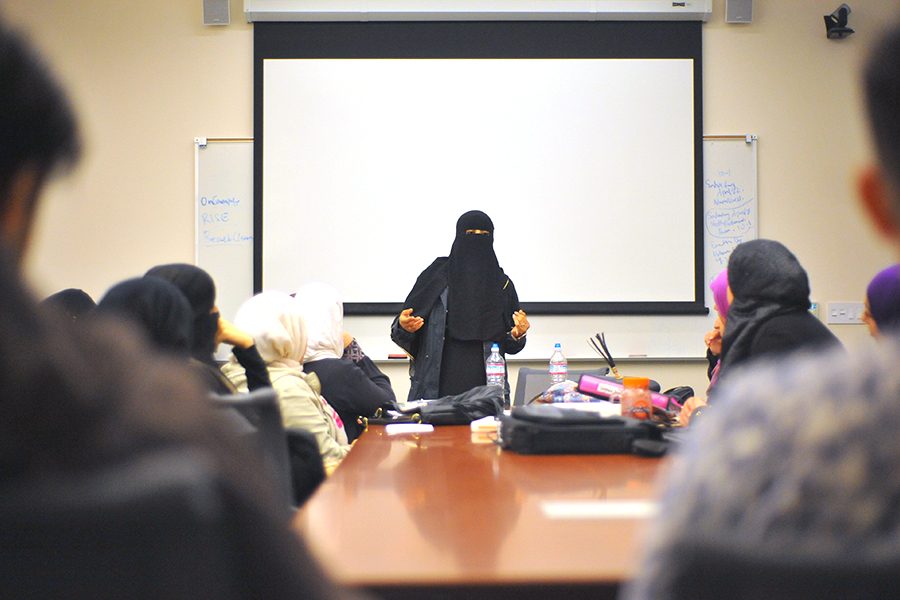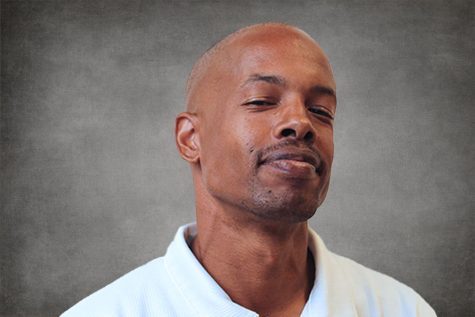MSA president promotes club unity
Group aims to dispel modern myths about global religion
cody casares / The Advocate Muslim Student Association President Rayah Khaled designates tasks to members during their club meeting in the Student Administration Building on March 22. Khaled’s approach for the club is to be active on campus.
Mar 29, 2017
Following the club’s formation in the spring of 2015, the Muslim Student Alliance (MSA) remains an active force on campus working toward improving the community and dispelling any negative stigma surrounding the Muslim community.
The club’s president, Rayah Khaled, continues to uphold the initial focus of the group despite this being her first semester at the helm of the organization.
“The overall goal of the MSA is to create a sense of community between both Muslims and non-Muslims on campus and to divest any misconceptions there are on campus about Islam and Muslims,” Khaled said.
“As for how we decide what direction the club progresses in, we try to keep in mind what we can do to help all students in any way regardless of beliefs as well as give back to our community.”
As its president, Khaled has set her own bar to measure the club’s success and effectiveness.
“My goal is to keep the MSA as active as possible and to bring many people together and to mutually agree on ways we can help, teach and give back not only to our school, but to other individuals as well,” she said.
The MSA is an inclusive club and allows members of all kinds to join their ranks to help educate and spread awareness across the campus.
Non-Muslim members of the club feel at home in the group and think that being associated with the group is a positive influence on themselves and for others who may think the MSA is a segregated community.
In this era of weaponized information, fake news and alternative facts, these members exemplify the true nature of the club and its purpose.
Nursing major Sarabjot Kaur is one of the non-Muslim members of the club and joined out of a sense of kinship with some of her friends who are MSA affiliates.
“I want to learn more about their religion and what they put up with. I have a lot of Muslim friends and I can relate to them being from India,” Kaur said.
“There are a lot of Muslims in India and I find their culture beautiful. The MSA feels like family because we connect.”
Kaur also hopes her association with the MSA will encourage others to overcome perceived notions and personal barriers that prevent them from strengthening bonds with students from different cultures on campus.
“If I’m a part of it, it may give others the courage to learn about each other’s cultures,” she said.
The club’s strategy of inclusiveness was put into action this semester when Khaled proposed the creation of an interfaith observance space to allow students from any religion a quiet space to meditate, pray or observe spiritual or cultural doctrines in peace.
A quiet corner of this type is not yet available on campus.
As of now, Muslim students find solace for prayer in the back of the Library and Resource Learning Center.
The efforts of the MSA could provide a benefit to all students on campus while having a lasting effect toward dispelling common misconceptions about the religion and the students who practice it — even as politicians and pundits continue to present the religion as some global scourge.
“We are not monsters. We are normal people like everyone else,” English major Asma Alkrizy said.
“The MSA exists to help people understand the misconceptions of Islam and the ways all religions can be friendly to each other — ultimately strengthening the bonds between those religions,” she said.



